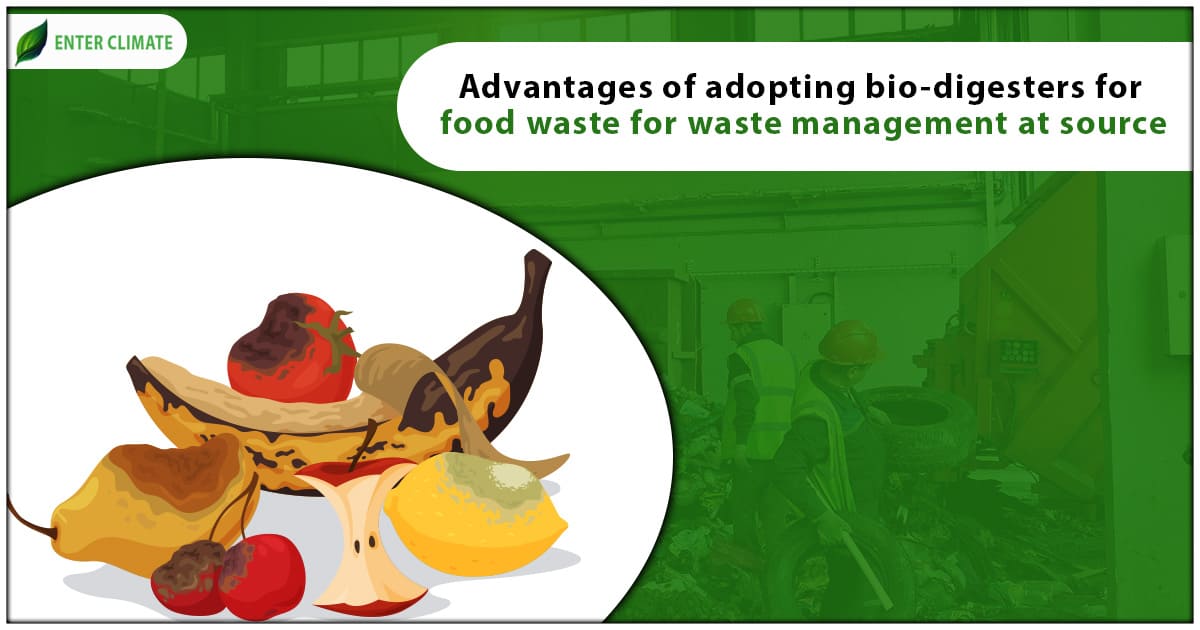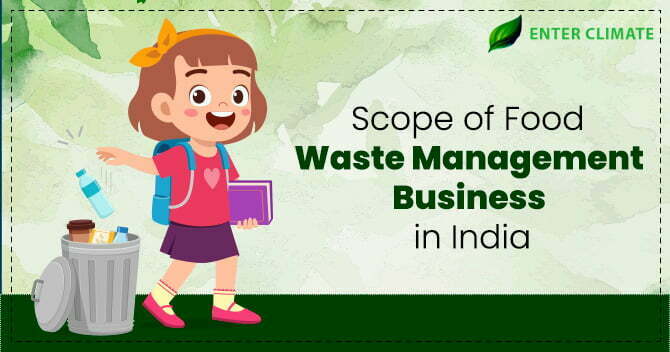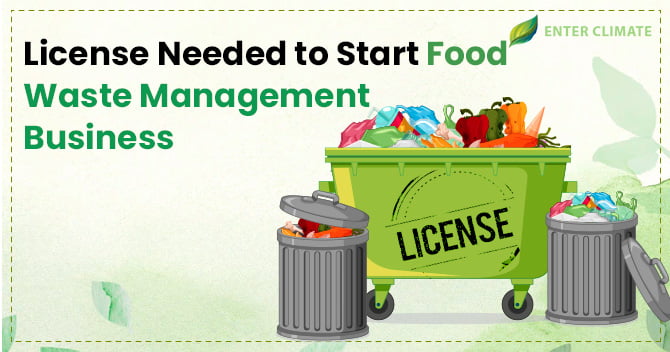Advantages of adopting bio-digesters for food waste for waste management at source
 20 Jun, 2023
20 Jun, 2023 
In bio-digesters for food, waste bio-digesters are tanks designed to convert agricultural waste into energy. They are crucial in promoting sustainable farming practices by reducing greenhouse gas emissions and improving farmers’ livelihoods. To utilize biodigesters, individuals deposit manure or excess food scraps into a covered tank filled with water, where microorganisms break down the waste. This process generates methane, which accumulates and moves into a separate compartment. The gas can then be extracted for cooking purposes. The residue left in the tank, known as digestate or bio-fertilizer/bio-slurry, can be used as a crop fertilizer. Biodigesters allow farmers to enhance sustainability by transforming their waste into valuable products.
Applicability of Bio-digester in Food Waste Management
The Bio-digester’s food waste Management must include the following:
- Environmental sustainability: Minimizes kitchen waste by up to 100% and contribute to a greener footprint.
- Convenient waste disposal: A scientifically sound process free from flies and odours, allowing for efficient organic waste management. This process generates high-quality biogas and nutrient-rich manure.
- Cost savings: Experience significant savings by replacing liquefied petroleum gas (LPG) and eliminating waste disposal expenses.
- Regulatory adherence: Must ensure compliance with the latest Municipal Solid Waste Rules, MSW 2016, and meet relevant regulatory requirements.
Energy Recovery from Food Waste
The energy recovery in bio-digesters from food waste can include the following approaches: –
- Cooking: biogas produced can be directly utilized as a thermal energy source to replace LPG or PNG for cooking purposes. This can be achieved by incorporating customized burners and stoves or modifying existing burners if feasible.
- Steam generation: Utilizing biogas directly as a thermal energy source to produce steam through biogas-driven steam generators and help generate energy.
- Hot water: Utilizing biogas directly as a thermal energy source to generate hot water using biogas-driven hot water generators. Depending on the specific site requirements, this can be customized to provide hot water for cooking or non-cooking applications.
- Power generation: Generating electricity by employing 100% Biogas Generators as a substitute for electric power sourced from the grid. This option is viable for medium to large-scale operations.
- Bio-CNG[1]: Directly replacing LPG/CNG/vehicular fuel with biogas. This application is generally feasible for large-scale operations.
Advantages of Using Bio Digesters
Diversion of Organics from Landfills
In bio-digesters, food waste organic materials found in municipal solid waste (MSW) can be separated and processed in an anaerobic digester. These materials include:
- Food scraps from households
- Food scraps from businesses, such as restaurants
- Waste from commercial food processing
- Fats, oils, and greases
- Yard waste
Manure Management
Anaerobic digesters are employed on livestock farms as part of an integrated approach to manure management, offering farmers additional options. These systems enable farmers to:
- Reduce methane emissions from manure lagoons, stockpiles, and storage ponds.
- Minimize odours and pathogens associated with manure.
- Generate on-farm products like animal bedding and high-quality fertilizer.
- Lower the solids content of manure.
To enhance biogas production, livestock manure can be combined or “co-digested” with other organic materials within anaerobic digesters.
Key Benefits of using bio-digesters in food waste management
Keeping organic materials out of landfills is environmentally beneficial. If these materials decay in landfills, they can release methane into the atmosphere, contributing to climate change. Additionally, landfilling organic materials results in the loss of valuable nutrients from our ecosystem. Anaerobic digestion of these materials allows for the recovery of nutrients found in digestate, which can nourish and enrich the soil.
- Renewable Energy Generation – Anaerobic digestion of organic materials produces biogas, a renewable energy source. Biogas can be used to power engines, generators, or a combination thereof, to produce mechanical power, heat, and/or electricity. It can also be compressed for use as vehicle fuel, and with appropriate treatment, it can be used similarly to natural gas.
- Reduction in Methane Emissions– Methane is produced when organic materials decompose in oxygen-free environments like landfills and manure lagoons. Anaerobic digestion systems capture methane, allowing us to utilize it in beneficial ways. Capturing methane is important because it is a potent greenhouse gas that contributes to climate change when released into the atmosphere.
- Nutritional Value – Biogas is stored and used as a cooking fuel, replacing liquefied petroleum gas (LPG). The liquid fertilizer produced through this process has a high nutritional content and can be easily applied to fields, gardens, or landscaped areas. This fertilizer is odourless, free from pathogens, and ready for plant uptake.
- Social, Environmental, and Economic Benefits – This compact and user-friendly technology offers substantial social, environmental, and economic advantages by enabling timely and proper waste disposal while substituting non-renewable fuels with biogas. It provides macro-economic benefits through decentralized energy generation and environmental protection, as well as micro-economic benefits by serving as a substitute for both energy and fertilizer.
Solid Waste Management Authorization for Using Bio Digesters
Individuals engaging in waste management activities, including solid waste management, must obtain authorization from the pollution control board. Prior approval from the state pollution control board or pollution control committee is required, and this can be sought by applying Form I under the SWM Rules, 2016.
The Pollution Control Board will review the authorization proposal, conduct necessary inquiries, and, upon receiving the Form I application from the local body or any authorized agency, issue the authorization in Form II within 60 days. The authorization will include compliance criteria, environmental standards as specified in Schedule I and II, and any other required conditions.
The State Pollution Control Board or pollution control committee oversees environmental standards and ensures adherence to waste processing and disposal site conditions.
Documents Required for Solid Waste Management Authorization in Bio-digesters for food waste
- Aadhar Card of the authorized signatory.
- PAN Card of the authorized signatory.
- GST Certificate.
- Proof of site ownership or rental/lease agreement.
- Factory license or trade license.
- Electricity bill.
- Layout plan.
- Process flow chart.
- Details of installed machinery.
Conclusion
The adoption of bio-digesters for food waste offers numerous advantages and presents an innovative business solution for waste management at its source. The biogas produced from bio-digesters can be utilized as a renewable energy source. This reduces reliance on non-renewable energy sources, saving energy and lowering greenhouse gas emissions. Bio-digesters efficiently manage organic waste, minimizing unpleasant odours and reducing the presence of pathogens. This creates a more hygienic environment and improves overall sanitation. Applying digestate to agricultural land enhances soil health, increases organic matter content, reduces the need for chemical fertilizers, and improves crop growth. This contributes to sustainable farming practices and helps preserve valuable nutrients within the ecosystem. It is recommended to take expert consultation while dealing with bio-digesters for food waste to check what compliances are applicable as per the utilization and avoid penalties due to non-compliance.
FAQ
The production of biogas from food waste usually takes around three weeks. During this time, most of the organic matter undergoes decomposition, resulting in biogas, a mixture of methane and carbon dioxide.
The efficiency of biogas generation depends on various factors, including temperature. Higher temperatures generally lead to increased biogas production. Other factors affecting biogas generation include the carbon-to-nitrogen (C/N) ratio, pH value, compression ratio, and total solids concentration.
Biodigesters employ a variety of bacteria to facilitate anaerobic digestion. The process can occur within a temperature range of 5-60°C. Methanogenic bacteria, in particular, are critical for biogas production. These bacteria are more sensitive to temperature changes compared to other microorganisms found in a biodigester, as their growth rate is slower.
Bio-digesters effectively convert food waste into biogas, reducing the amount of waste that ends up in landfills.It can be used for various purposes, such as cooking, steam generation, hot water production, power generation, and even as a replacement for conventional fuels like LPG or CNG.The leftover residue from the bio-digestion process, known as digestate, can serve as a nutrient-rich fertilizer.
Manure management is helpful in the following ways:
– Reduce methane emissions from manure lagoons, stockpiles, and storage ponds.
– Minimize odours and pathogens associated with manure.
– Generate on-farm products like animal bedding and high-quality fertilizer.
-Lower the solids content of manure.
Read our Article:License Needed To Start Food Waste Management Business













